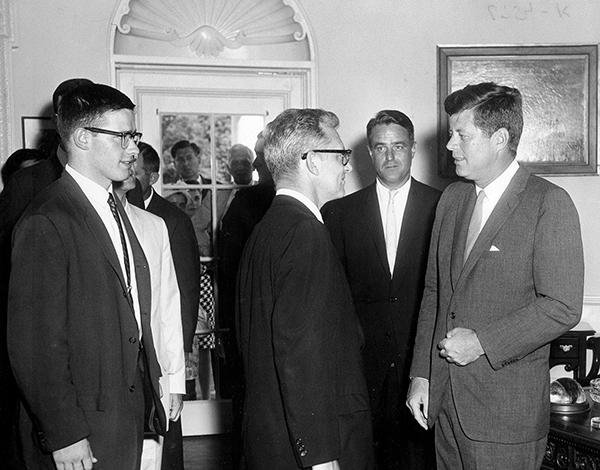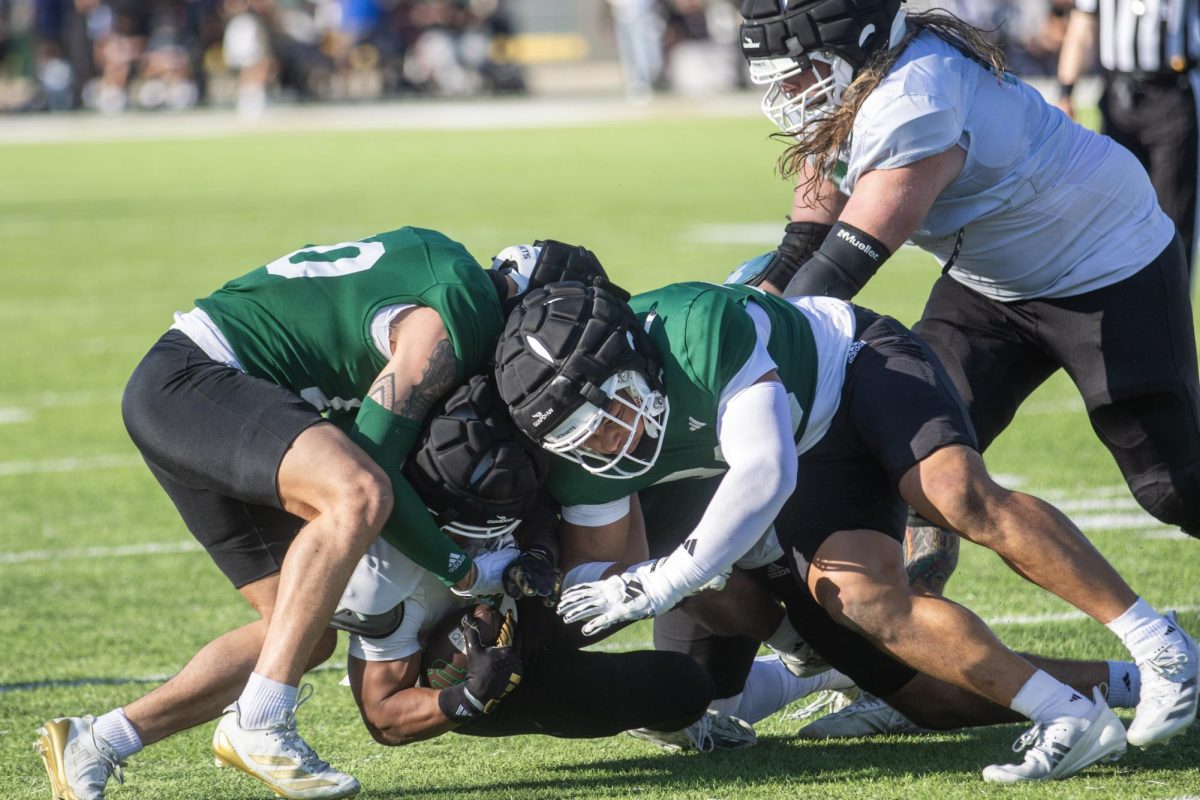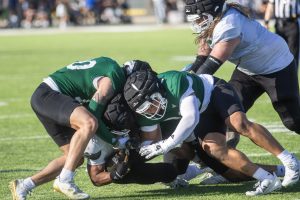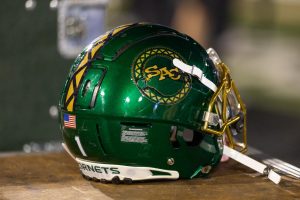Professor’s lifelong pursuit of education began in Africa

Retired Sac State physics professor Michael Shea, left, waits to greet President John F. Kennedy during the historic White House Rose Garden ceremony on Aug. 30, 1961. It was held to honor the first Peace Corps volunteers.
September 28, 2011
From teaching overseas, to meeting former President John F. Kennedy, to starting a program to assist local science teachers to earning community service awards – few could expect to match the accomplishments of Michael Shea, a retired Sacramento State physics professor.
Shea started his teaching career at Sac State in 1969, and continued for 38 years. From 1997 to 2000, he was chair for the department of physics and astronomy. In 2001, he was installed as associate dean for the College of Natural Sciences and Mathematics.
Shea credits his educational achievements to his volunteer work for the Peace Corps in Ghana and West Africa.
“My time in the Peace Corps had an enormous effect on my life,” Shea said. “Going and living in another culture, and trying to provide some level of support and knowledge is difficult. However, the experience is invaluable and changes your perspective on life.”
He and 50 other Peace Corps volunteers arrived at Ghana’s Akim Abuakwa State College on Aug. 30, 1961, to work as teachers. The Peace Corps was established on March 1 of that same year through an executive order from Kennedy.
“Ghana is the first Peace Corps country and Mike Shea was one of the first Peace Corps volunteers,” said Kelly McCormack, Peace Corps’ spokeswoman. “More than 4,120 Peace Corps volunteers have served in Ghana since the program was established.”
Shea got his start by studying mechanical engineering at University of Minnesota during the height of the Cold War, during a time when engineering was in high-demand. However, he found his calling was in teaching after entering the Peace Corps.
“As an undergraduate student, the thought of becoming a teacher never crossed my mind,” Shea said. “After teaching in Ghana, I really started thinking about the way that students learn. Physics can be a real struggle for a lot of people, but if you allow them the opportunity to develop their own knowledge – they will flourish.”
After returning from Ghana, Shea earned a master’s degree in physics from the University of Minnesota in 1966. He then continued his education by graduating with a doctorate in experimental solid state physics in 1969 from Bryn Mawr College in Pennsylvania.
He received multiple job offers after earning his doctorate, but chose Sac State based on how the college handled personal and professional education.
“Something that I have always enjoyed about Sac State is the balance between research and teaching,” Shea said. “I always very much enjoyed the teaching side of things, but at the same time, we were encouraged to remain professionally active. It is critical that a faculty remain active in their discipline.”
During his time as a professor at Sac State, Shea served 12 years on the University Research Committee. One of his initiatives was advocating for university support for faculty conducting research, allowing professors time off to continue working within their respective field.
His focus on research, however, did not overshadow his efforts within the classroom.
“I have always tried to promote careful examination of the way that students learn,” Shea said. “Science and mathematics has a tendency to be taught in large lecture halls, which is not the best way to learn these subjects.
It’s so much more beneficial to get hands-on experience.”
Shea’s interest in education lead him to begin the Center for Mathematics and Science Education at Sac State, which provides professional development in mathematics and science education for more than 900 K-14 teachers. The budget of the center is around $300,000 annually, which is mainly supported through grants.
After founding the center, Shea acted as director from 1985 to 1990, and then worked as a faculty adviser. Even following his retirement in 2007, he continues to attend events held by the center, such as “Science in River City,” a workshop for the development of third- through 12th-grade science teachers.
“Mike is one of those professors that is as interested in improving education as he is in teaching it,” said Rich Hedman, interim director for the Center for Mathematics and Science. “Many faculty would echo his deep commitment to improving science education. He has put so much of his time into it throughout his entire professional career.”
For his efforts in improving science teaching in local schools, Shea received the University Lifetime Achievement Award for Community Service and the College of Natural Science and Mathematics Community Service Award.
From Hedman’s personal experience observing Shea teach K-12 educators, he has a clear picture of how Shea would conduct his own classroom and lab sessions.
“I have noticed he is not a pure lecturer, and is not going to put (his) audiences to sleep,” Hedman said. “He creates experiences that guide people towards their own learning process. The textbook, for him, is just a good reference point to call upon after discovering things through experience.”
Shea on Sept. 19 traveled to Washington, D.C., to attend a week’s worth of events held in commemoration of the Peace Corps’ 50th anniversary. He was among thousands of Peace Corps volunteers in town for the events.
Shea said having the opportunity to participate in the Peace Corps during its infancy was life-defining, and wishes to promote the experience to others.
“I would really encourage that students look for opportunities within the Peace Corps,” Shea said. “You will have a better sense of the world around you. Believe me, coming from a small town in Milwaukee to traveling to West Africa – it changes you.”
Brett Johnson can be reached at [email protected]





























































































































Richard Timmer • May 3, 2020 at 11:25 am
Looking to contact Mike Shea, former teammate and roommate at Marquette U.
Richard Timmer • May 3, 2020 at 11:22 am
I’m a former Marquette classmate and football teammate of Mike’s. Looking for his email contact. Can you help?